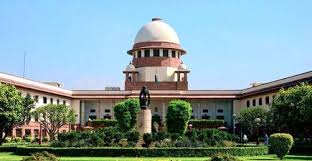Latest News
Obtain Copies Of Court Documents By Applying Under Court Rules Only

In the case of Chief Information Commissioner v. High Court of Gujarat and Another, the Supreme Court bench comprising Justices Banumathi, AS Bopanna and Hrishikesh Roy held that information to be accessed or certified copies on the judicial side is to be obtained through the mechanism provided under the High Court Rules and the provisions of the Right to Information Act shall not be made used of.
The bench held that one must apply under court rules to get certified copies of court documents. The Supreme Court has said that so far as the third parties' right are concerned, court documents, information on the judicial side, the certified copies of orders, documents and other proceedings cannot be obtained by them under RTI Act.
In 2010, an RTI application was filed to access certified copies of court documents pertaining to two cases. For both the cases, the applicant was a third party. The dispute arose when the applicant was informed to apply under the Gujarat High Court rules for the documents sought. Successive challenges to the High Court's refusal resulted in the Chief Information Commissioner granting these documents to the applicant.
However, a Division Bench of the Gujarat High Court eventually set aside the Commissioner's decision, stating that when a particular field is governed by the rules which have not been declared ultra-vires, then there is no question of applying the fresh rules and muddle the situation. This High Court ruling prompted an appeal before the Supreme Court.
The Chief Information Commissioner and Gujarat Information Commission had challenged the above mentioned High Court order which had held that the high court rules governing the issuance of certified copies of document prevailed over the provisions of Right to Information Act. The High Court noted that when a copy is demnded by any person, the same has to be in accordance with the high court rules on the subject.
Rule 151 of the Gujarat High Court stipulates that for providing copy of documents to the third parties, they are required to file an affidavit stating the reasons for seeking certified copies. Therefore, the issues before the Court were:
i) Whether the above Rule suffered from any inconsistency with the RTI Act provisions;
ii) When there are two machineries to provide information or certified copies, ie. High Court Rules and/or RTI Act, whether the provisions of RTI Act can be employed to for obtaining certified copy or information in absence of inconsistency in the High Court Rules.
The Hon'ble Supreme Court commented that in order to maintain the confidentiality of the documents and other information pertaining to the litigants to the proceedings and to maintain proper balance, Rules of the High Court insist upon the third party to file an application or affidavit to obtain information or certified copies of the documents, lest such apllication would reach unmanageable proportions apart from the misuse of such information.
The bench agreed with the Delhi High Court view in the Registrar Supreme Court of India v. R.S. Misra, 2017, wherein it was held that once any information can be retrieved through the mechanism provided under another statute, then the provisions of the RTI Act cannot be resorted to.
Document:



































































































